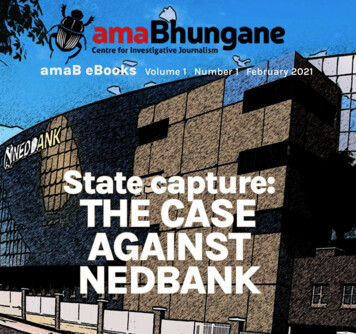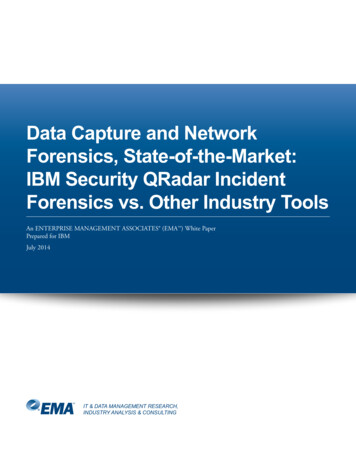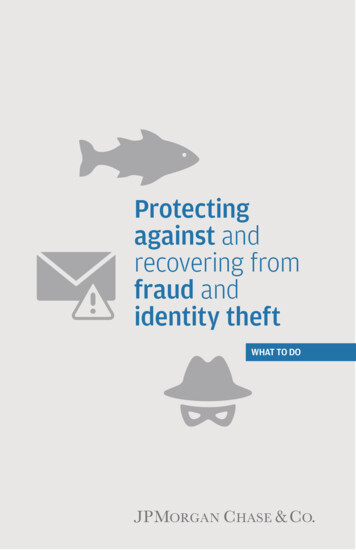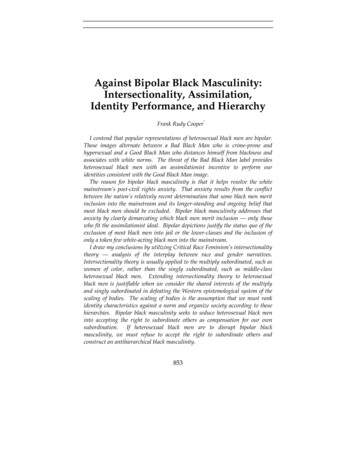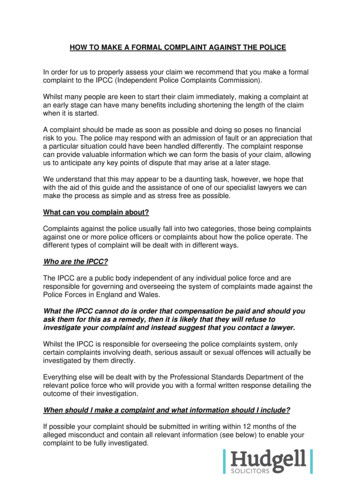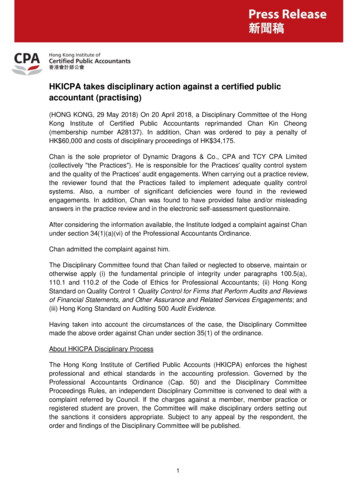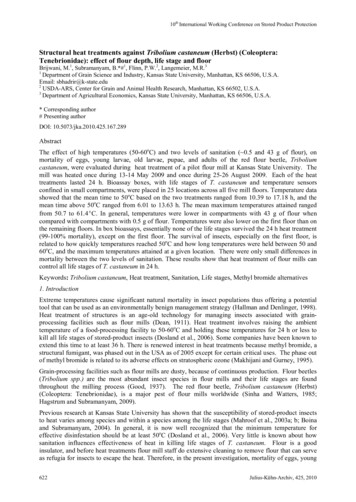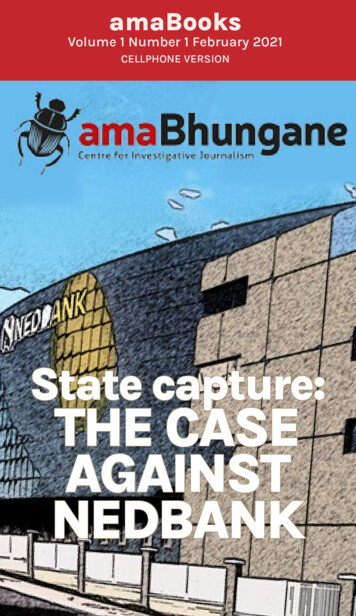
Transcription
amaBooksVolume 1 Number 1 February 2021Cellphone versionState capture:The caseagainstNedbank
State capture:The caseagainstNedbankSusan Comrieand Sam SoleIn the saga of disgraced financialservices firm Regiments Capital, onename keeps popping up: Nedbank.After years of digging, amaBhunganecan disclose that: Nedbank entered a pact withRegiments, rewarding it for pushingthe bank’s financial products to publicsector clients whom Regiments wassupposed to advise impartially. Some of these entities lost billions,. YetNedbank agreed to pay Regiments atleast R95-million in commissions, mostin the form of ‘introduction fees’ forhelping it secure business from publicentities. These commissions – and an additionalR120-million from a similar set ofTransnet deals – were rolled intoNedbank’s charges, at times withoutthe knowledge of Regiment’s clients.
1Alarm bellsring inMathane’s headMathane Makgatho wastired. She had spent twoyears being gaslit by seniorexecutives at Transnet whotried to ram questionabletransactions down her throat. As treasurerof the state rail company, she had stood herground. But here, once again, was RegimentsCapital offering a deal that her years ofexperience told her was simply implausible.She had reason to be suspicious.A year earlier, Transnet’s chief financialofficer, Anoj Singh, had handed her a proposalfrom Regiments for a R5-billion Nedbank loanand told her to sign it “today”. But when sheread it, alarm bells went off.Instead of a direct loan from Nedbank,the deal was to be channeled through anintermediary company which would collectinterest on behalf of Nedbank, a convolutedarrangement that would cost Transnet R750million more than was necessary.The proposal was so alarming that she hadgone straight to Transnet chief executive BrianMolefe: “I was irate. I explicitly told him thatshould we approve the structure, we will go tojail for stealing money,” she later told the Zondocommission.
That 2013 deal had disappeared, butRegiments had not. And now, in July 2014,she was again being asked to sign off on aRegiments proposal involving Nedbank thatmade her deeply uncomfortable because shefelt it was so obviously mispriced.As far as Makgatho could tell, what wasfueling the pipeline of questionable dealslanding on her desk was the rather too closerelationship between Regiments directorEric Wood and Nedbank’s head of credit andinternational derivatives, Moss Brickman.Makgatho told the commission that she wasso appalled by Wood and Brickman’s latestgambit that she asked the bank to “lodge acomplaint” with Nedbank Capital, the divisionwhere Brickman worked.“I was not happy [with] what . I thoughtit was an improper relationship. Regimentswill come with certain proposals . and at theback of those proposals there was always onecommon bank and that was Nedbank.”Mathane Makgatho . feltdeeply uncomfortable
Makgatho resigned soon after, in early2015, but she had put her finger on a questionamaBhungane had been asking for years: Whywas it always Nedbank?2/In brief: thecase againstNedbankEverywhere we have followedRegiments on its destructive paththrough state-owned entities andmunicipalities we kept seeingNedbank offering loans, complexfinancial products called interest rate swaps,and millions of rands in hidden commissions.The case we will outline in the pages thatfollow is this:For years, Regiments persuaded its clients– public entities who paid and trusted it forindependent advice – to take up financialproducts, often provided by Nedbank. ButRegiments’ advice was tainted by the promiseof massive additional fees.If the client agreed to take up loans orinterest rate swaps, Regiments got millionsfrom the bank; if the client did not, Regimentsgot only its standard advisory fee from theclient.This was initially set out in a “highlyconfidential” commission agreement which sawNedbank pay millions in “introduction fees”for each new deal Regiments brought to thebank. Later, Nedbank agreed to act as postman,
Regiments was able to generateat least R95-million in fees fromNedbank, plus another R120-millionfrom transactions where the feesonce again flowed via Nedbank delivering millions of rands of public moneyto the controversial firm, with the blessing ofRegiments’ public sector clients.By our calculation, Regiments was able togenerate at least R95-million in fees fromNedbank via these two methods, plus anotherR120-million from a set of Transnet transactionswhere the fees once again flowed via Nedbankbut without, the bank claims, its knowledge.The additional fees incentivised Regiments topropose deals that were not always in the bestinterests of its clients – state-owned entitiesand municipalities.Nedbank ignored the obvious conflict ofinterest because Regiments promised that thefees were always disclosed to its clients, but theevidence shows the Nedbank knew or oughtto have known this was not true – and thatRegiments was abusing its influence with publicofficials.Over the years Regiments brought Nedbankdeals running into billions, and the promise ofadditional fees in turn encouraged Regiments topropose a dizzying array of interest rate swaps.But some of these high-risk transactions proveddisastrous for the clients, who lost billions.To understand the scheme – and thetroubling partnership between Regiments andNedbank – we need to go back to 2009, andfollow a trail that leads through four Regimentsclients: The City of Johannesburg, the City ofTshwane, Airports Company South Africa (Acsa)and, finally, Transnet.
EXPLAINERR95 Million (atleast) in feesYou might think it easy to calculatehow much Nedbank paid toRegiments. It is not. But this iswhat we do knowIn 2013, Nedbank prepared a spreadsheetof 156 payments due to Regiments between2009 and 2029, when some of the lastinterest rate swaps will expire. The total,seemingly for interest rate swaps andloans, was R95 204 410 (excluding VAT).R95.2mR95.5morAmaBhungane has done its owncalculations using invoices and emails topiece together payments that were made (orpromised in future) to Regiments. On sometransactions Regiments was entitled to alarger fee paid in installments over manyyears, but opted to take a smaller fee paidup-front; in these instances we countedthe smaller fee. In total, we got R95 512 192(including VAT where applicable).This excludes R120-million that Regimentsreceived on the Transnet interest rate swaps.Keep in mind that R100 paid on Day One isworth a lot more than R100 paid in 2029.
R62mR33mThe majority wasinvoiced under theIntroduction to DerivativeTransactions agreement,whereby Nedbank agreedto pay Regiments afee or commission forbringing it new businessopportunities.The rest was invoiced as"services rendered". Inthese instances publicsector clients had allowedRegiments to collect a feefrom the bank insteadof paying Regimentsdirectly. R120mThe R95-million excludes the2015/16 Transnet interest rateswaps where Nedbank did not payRegiments directly but facilitatedthe up-front payment of R120 635798 to Regiments. Nedbank claimsit did not know it was passing onthese fees.With sometransactions,Regiments sharedthese fees withbusiness partners
ICITY OF TSHWANEACSATRANSNETR34.6mR44.8mR120.6mR16.1mCITY OF JOHANNESBURGIn most cases Regiments’ fees arefunded by charging the client ahigher interest rate on loans andinterest rate swaps.So who ultimately pays these fees?n putting together this story we reviewedhundreds of internal emails, numerousconfidential reports and affidavits.We sent detailed questions to Regiments’directors. Two ignored us; one declined tocomment. Regiments previously defendedits actions, saying what it did was “commonmarket practice”.We also conducted two on-the-recordinterviews with Nedbank in 2018. As furtherevidence emerged, both through our own
investigations and via testimony at Zondo,Nedbank became far less forthcoming.When we approached Nedbank againlast year, it was no longer willing to provideinformation it had previously committed toshare. We sent a 35-page letter setting out theevidence we had and the conclusions we werelikely to draw, but the bank did not respond indetail, instead saying in a statement:“[W]e have previously met with you with thesole intention of providing you with the correctcontext and factual scenario and were openand honest in responding to your questions.”The proposed article “does not containanything new besides what we believe areunsubstantiated conclusions drawn by you.“Nedbank has at no time acted unlawfully, orimproperly in its dealings with Regiments andEVIDENCE DOCKETDig into the evidence yourself. Originaldocuments supporting our claims can befound online in our evidence docket:#1 Nedbank: Introduction ofDerivative Transactions#2 Nedbank: City of Joburg andCity of Tshwane loans and swaps#3 Nedbank: Acsa#4 Nedbank: City of Tshwanerestructuring#5 Nedbank: Transnet
the affected counterparties. Nedbank deniesany inference or accusation that Nedbank wascomplicit in any alleged scheme by Regimentsto defraud its clients. Nedbank also rejects anysuggestion that it ignored ’red flags’ relating tothe conduct of Regiments.”Here is the evidence which, in our view, saysotherwise.3/the five pagecontract atthe root of itThe contract was barely fivepages long. Signed in May 2009,and dubbed Introduction ofDerivative Transactions,it promised Regiments a fee forbringing new business to Nedbank.The existence of this contract remained asecret for seven years, until 2016 when lawyersfor one of Regiments’ clients uncovered millionsin undisclosed fees.In an emailed response, Regiments directorNiven Pillay showed the lawyers this “highlyconfidential” document but warned thecontract should not to be shared with anyone“without our expresspermission”.Read“Regiments AdvisoryNedbank’s[has] been referringfullbusiness and earningits fees from the banks”, statementPillay wrote, assuring
the lawyers that this was a “common marketpractice”.And although the phrase “introduction fee”was changed to “fee” in the final version of thecontract, the principle remained the same: ifRegiments brought Nedbank new business, itwould get a cut.Introduction fees are not uncommon butthey are a rich vein for corruption.As a result, the Financial Advisory andIntermediary Services Act and its code ofconduct are clear that an advisor like Regimentshas to disclose “any incentive . commission,fee” it is getting on the side. This is not idlelegalese, but a very real protection for clients,who need to know that their interests and notthose of third parties are being served.AmaBhungane was able to access a batchof correspondence between Regiments andNedbank, including drafts of the Introductionof Derivative Transactions agreement. Aclose study of the “track changes” shows thatRegimentsdirector NivenPillay showedthe lawyersthis “highlyconfidential”document
Regiments director Eric Wood tried to deletethe clause that said Regiments had to tell itsclients that it was getting a sweetener from thebank.The clause was reinserted into the agreementafter Brickman, Wood’s contact at thebank, reported that Nedbank’s compliancedepartment “is adamant that a clause relatingto the disclosure to the client be included”.This episode should have set off alarm bellsat Nedbank. Regiments’ clients were almostalways in the public sector and generallyRegiments had been hired (and paid a fee)by them to advise them on complex financialtransactions. If Regiments was being offered anextra fee on the side, those public sector clientshad a right to know.When we interviewed Nedbankin 2018, Anél Bosman, thenmanaging executive of corporateand investment banking, tried to downplayRegiments’ reluctance to include a disclosureclause: “[W]hether that clause was included ornot was an additional measure that the banktook because we wanted the right to ask for itfor our own records. But Regiments at all times,being regulated by the [Financial ServicesBoard], had that responsibility in any way.”The final agreement, signed in May 2009,confirmed that “Regiments undertakes todisclose to the Client” that Regiments wouldreceive a fee from Nedbank and added that“Regiments will provide Nedbank Capitalwith written proof of such disclosure whenrequested.”In a number of cases, the only written "proof"Regiments provided was a one-line disclaimeradded at the bottom of its invoices to Nedbank:“Regiments Capital (Pty) Ltd has informed itsclient that it is earning a fee for the facilitationof the above transaction.”But had it?
Absa asks forfull disclosureRegiments wasted no time. Assoon as it received a copy of Introduction of Derivative Transactions from Nedbank, it copied it acrossonto a Regiments letterhead, deletinga few clauses along the way, includingthe disclosure clause.Then Regiments sent a copy to Absa,which had also been approached toquote on an interest rate swap at Acsa.Absa agreed to enter into the introduction fee agreement with Regiments,but added a clause saying that Absawould write a letter to the client ‘wherein ABSA Capital will disclose that a feehas been paid to Regiments’.In other words, Absa would not leaveit up to Regiments to disclose the fee.Absa was unwilling to go into detailabout the contract but told us: ‘This isa standard introducer agreement, interms of which we disclose the fees.’(Emphasis added.)It appears that this did not suit Regiments, and as far as both we and Absacan tell, Absa did not receive any derivatives business from Regiments aftertheir agreement was signed.
4/naked swapsand hiddencommissionsOne of the first deals thatRegiments brought to Nedbankunder the Introduction ofDerivative Transactionsagreement was an interest rateswap with one of Regiments’ most loyal clients:the City of Johannesburg.In 2009 the city found itself in trouble. It hadentered into a series of interest rate swaps tobalance out the risk of various loans. But theloans had been paid off early leaving the cityholding “naked” swaps, a speculative positionthat did not sit well with the auditor general,who instructed the city to get the swaps off itsbooks.There were several ways the city could dothis: the simplest was to unwind the swaps withStandard Bank and RMB, the counterpartieswho sat on the other side of the swaps.Instead, Regiments’ Wood and Pillayproposed the city enter into a convoluted,two-step transaction: the city would cede theswaps to its sinking fund which would then payNedbank to take over the swaps. The sinkingfund (a pool of money set aside for paying longterm debts) was conveniently managed by asubsidiary of Regiments.The transaction would cost R12-million, thetwo Regiments directors told city treasurer
Nedbank’s Visnenza evenhad a copy of the “confidential”proposal where Regiments FundManagers lied to the city aboutthe mid-market rate. William Mathamela. The city would have to payNedbank R11-million to take over the swaps,which they assured him was the going marketrate, plus modest costs of R1-million.Mathamela approved the proposal on hislast day in office. He would resurface a fewmonths later as Regiments’ business partner,but in a written responsedenied that this played anypart in approving theReadMathamela’s transaction.But, unbeknown tofull responsethe city, Regiments hadstruck a backroom dealwith Nedbank.The details are spelled out in emailsbetween Wood, Brickman and anotherNedbank employee, Mario Visnenza: Thebank would take over the swaps and be paidthe going “mid-market” rate of R5.2-million; itwould take another R750 000 to cover its costsand R2-million as profit.These costs would be deducted from theR12-million that the city had blindly agreedto pay; what was left – more than R4-million– Nedbank would pay Regiments as “fee” forbringing it the business.Technically, there were two divisions ofRegiments involved in this scheme: RegimentsCapital was advising the city on how to managethe swaps while a subsidiary, Regiments FundManagers, offered the dubious solution. But
EXPLAINERInterest rateswapsAn interest rate swap is anagreement between two parties toexchange the interest rates theypay on loansPARTY APARTY BFLOATINGFIXEDPAYS:but hates riskParty A has a loan witha floating interest rate,which is unpredictableand risky. It wants topay a fixed rate, whichwill cost more but makeits debt repaymentsmore predictable.PAYS:but wants togambleParty B has a loanwith a fixed interest rate. It has moreappetite for risk andis willing to gamblethat interest rates willdrop.The solution: Party A and Party Bagree to swap interest ratesPARTY APARTY BNOW PAYSNOW PAYSFIXEDFLOATING
If interest rates INCREASE thenParty A is in the money and PartyB has to pay.PARTYPARTYPARTYPARTYBINTEREST RATESAABBut if interest rates DECREASE thenParty B is in the money and Party Ahas to pay.both were represented by Wood. And Wood(the advisor) was not about to tell the city thatWood (the fund manager) was lying about thecost of the transaction.Yet, when Regiments delivered its invoiceto Nedbank – issued under the Introductionof Derivative Transactions agreement – itconfirmed that “Regiments Capital (Pty) Ltd hasinformed its client that it is earning a fee for thefacilitation of the above transaction”.That seems unlikely.
Emails show that both city officials andKPMG, which had been appointed by theauditor general, asked Regiments for abreakdown of the R12-million, including “alldocumentation/justification that you may havereceived from Nedbank for the costs relatingto the unwinding of the COJ swaps”. ButRegiments failed to mention that more thanR4-million of that figure would go to pay itscommission.A city spokesperson told us: “The City wasat no point made aware by Regiments and/or Nedbank of the ‘Introduction of DerivativeTransactions’ . and of the fees paid toRegiments.”Nedbank, of course, knew that Regimentswas crawling all over the transaction,creating conflicts at every turn. It alsoknew that R12-million was excessive andthat the fat from the deal would end up inRegiments’ bank account.Nedbank Corporateand InvestmentBank headBrian Kennedy
Nedbank’s Visnenza even had a copy of the“confidential” proposal where Regiments FundManagers lied to the city about the mid-marketrate. But instead of warning the city that it wasbeing misled, the bank chose to participate inthe scheme.Brickman refused to speak to us. “I havelong since retired from Nedbank and have nocomment to add,” he said via WhatsApp, hisprofile picture showing him giving the camerathe middle finger.Visnenza, who still works for Nedbank, askedthat we direct all our questions to Nedbank.Importantly, Nedbank has never tried toKPMG shrugs it offKPMG was appointed by the auditorgeneral to conduct a high-level review of the city’s Regiments-managed sinking fund. KPMG’s draft reportshows that both it and the city independently reached the conclusion that themid-market rate should have been justunder R5-million, in other words roughlywhat Nedbank actually charged.But with no insight into the back-roomdeal, KPMG shrugged and concluded thatthe transaction was done at fair value. TheR12-million fee the city paid was probably ‘reasonable’, KPMG wrote in the draftreport, because it had been agreed uponbetween ‘two knowledgeable, willing parties in an arm’s length transaction’.KPMG would not say whether it standsby the conclusions in its draft report, butstressed it was ‘not involved in nor awareof any collusion or significant commission payments made to Regiments’.
distance itself from Brickman or Visnenza’sactions.During our 2018 interviews, Bosman (whowas Brickman’s boss) and Nedbank Corporateand Investment Bank head Brian Kennedy (whowas Bosman’s) repeatedly struggled to answerquestions or told us that they could not findthe relevant emails – all while Brickman andVisnenza sat upstairs.In its response to our 35-pages of questionslast year, Nedbank said: “Nedbank confirmsthat it was not aware, at the time, of anyunlawful or corrupt conduct by Regimen
bank. Later, Nedbank agreed to act as postman, delivering millions of rands of public money to the controversial firm, with the blessing of Regiments’ public sector clients. By our calculation, Regimen
